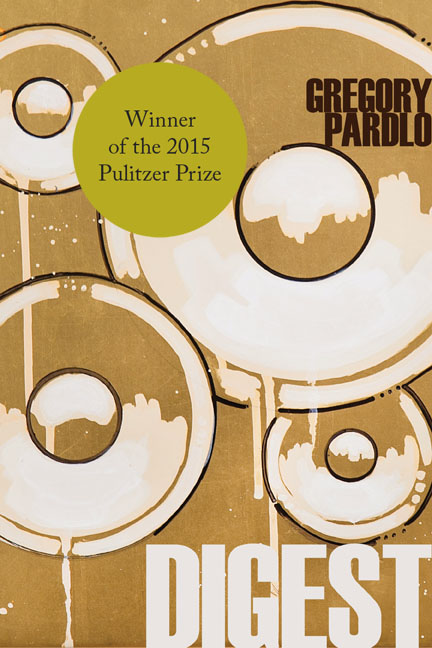
For a collection of poetry that is so intensely contemplative of the concept of fatherhood, Gregory Pardlo’s Digest has a strange way of first introducing this idea to its reader: we are five poems and eleven pages deep into the book when the voice we take to be Pardlo’s own, for it becomes clear that the distinction between speaker and author in Digest is heavily blurred, begins “Problema 2” by confessing that he is considering the defenestration of his incessantly crying infant daughter: “For all our sake, I tell my wife, / I’m going to throw the baby out the window now.” He is undecided yet on whether he is serious, and as he thinks of what he will actually do with this baby who will not stop crying, he is also thinking of Brooklyn (where much of Digest takes place), of his neighbors, of philosophers – for those whom the father-daughter sacrifice scenario might evoke Agamemnon’s slaying of his daughter at Aulis, you are in good company: Pardlo is thinking about that too.
This eclecticism of thought is characteristic of Digest – it would probably be easier to list realms of thought and history that Pardlo does not pull from to contextualize his thoughts than those that he does. “Problemata 1,” the poem which might be correctly assumed to immediately precede “Problemata 2,” references, with minimal exposition, Venus Williams, Wimbledon, Law & Order, the biblical Abraham, the blues musician Robert Johnson, and the post-Impressionist artist Paul Gauguin. That these people are, for the most part, utterly unrelated in pursuits and historical significance seems irrelevant to Pardlo, and they serve to illustrate his points so well that their lack of interconnection becomes irrelevant to the reader as well. The strength of the writing, however, means that the lack of explanation as to the inclusion of all these references is not so overwhelming as to alienate readers who are not familiar with all of Pardlo’s many allusions, and the overall feeling of the poem still comes through clearly. As much as this book has to do with fatherhood, so too does it deal with being a son – in “Problema 4”, Pardlo details asking his father, at 13, for a tattoo, and “Attachment: Atlantic City Pimp” describes an email from his father’s sister. This feeling of narrator as progeny is not only thematic, but stylistic – it’s hard to absorb Pardlo’s constant stream of reference and not feel like Digest is a kind of literary checkpoint that is continuously looking into the past to assure itself of its place in the present, much in the way that a child looks back to his parents for assurance. Even the collection’s title itself seems to point towards this: Digest is not just a digest in the sense of being an accumulation of knowledge, but the author’s bodily digestion of hundreds of years of history and literature and philosophy and entertainment, both sophisticated and less refined.
For a collection of poetry that is so intensely contemplative of the concept of fatherhood, Gregory Pardlo’s Digest has a strange way of first introducing this theme to its audience: we are five poems and eleven pages deep into the book when the voice we take to be Pardlo’s own, for it becomes clear that the speaker and author in Digest are at many times one and the same, begins “Problema 2” by confessing that he is considering the defenestration of his incessantly crying infant daughter: “For all our sake, I tell my wife, / I’m going to throw the baby out the window now.” He is undecided yet on whether he is serious, and as he thinks of what he will actually do with this baby who will not stop crying, he is also thinking of Brooklyn (where much of Digest takes place), of his neighbors, of philosophers – for those whom the father-daughter sacrifice scenario might evoke Agamemnon’s slaying of his daughter at Aulis, you are in good company: Pardlo is thinking about that too.
This eclecticism of thought is characteristic of Digest – it would probably be easier to list realms of thought and history that Pardlo does not pull from to contextualize his thoughts than those that he does. “Problemata 1,” the poem which might be correctly assumed to immediately precede “Problemata 2,” references, with minimal exposition, Venus Williams, Wimbledon, Law & Order, the biblical Abraham, the blues musician Robert Johnson, and the post-Impressionist artist Paul Gauguin. That these people are, for the most part, utterly unrelated in pursuits and historical significance seems irrelevant to Pardlo, and they serve to illustrate his points so well that their lack of interconnection becomes irrelevant to the reader as well. The strength of the writing, however, means that the lack of explanation as to the inclusion of all these references is not so overwhelming as to alienate readers who are not familiar with all of Pardlo’s many allusions, and the overall feeling of the poem still comes through clearly. As much as this book has to do with fatherhood, so too does it deal with being a son – in “Problema 4”, Pardlo details asking his father, at 13, for a tattoo, and “Attachment: Atlantic City Pimp” describes an email from his father’s sister. This feeling of narrator as progeny is not only thematic, but stylistic – it’s hard to absorb Pardlo’s constant stream of reference and not feel like Digest is a kind of literary checkpoint that is continuously looking into the past to assure itself of its place in the present, much in the way that a child looks back to his parents for assurance. Even the collection’s title itself seems to point towards this: Digest is not just a digest in the sense of being an accumulation of knowledge, but the author’s bodily digestion of hundreds of years of history and literature and philosophy and entertainment, both sophisticated and less refined.
Digest is divided into three parts: the first untitled, the second titled “The Conatus Improvisations,” and the third “The Clinamen Improvisations.” Pardlo’s first book of poetry, Totem, has several poems which present moments of his time managing the jazz bar that his grandfather owned, and the influence of that genre is clearly visible in the poems of the sections titled improvisations. Although each poem is distinct from the next, they all deal with more or less the same themes, and even reuse many of the same words: the four stanzas of “Four Improvisations on Ursa Corregidora,” for example, which are each given their own pages, are all narrated by the same woman with the same abusive husband, and each reuse the words “blues,” “fire,” “judge,” and “reveal,” among others, as if the speaker is riffing off of the same theme as a jazz musician might do. This reusing of theme and word choice feels to me to be as characteristic of Digest as the continual use of allusion, and may in fact be definitive of the book: as it repeatedly recontextualizes things that traditionally are associated with a bygone white, European, elite sphere into one that is present, multicultural, American, and accessible, it suggests that some things are very much worth revisiting.
Reviewed by: Noah Mazer
